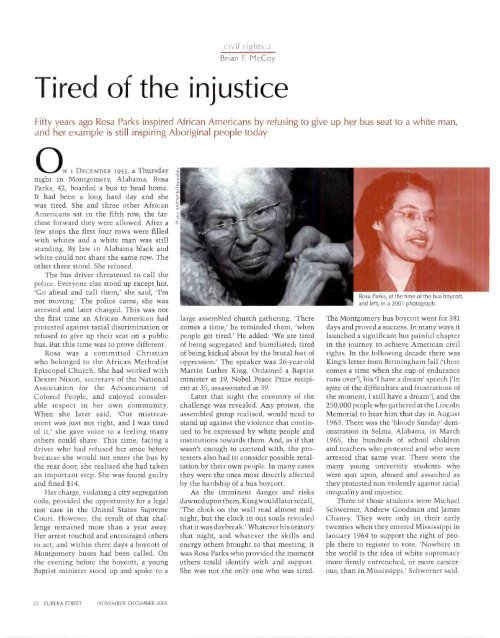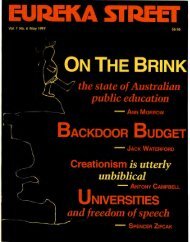0 - Eureka Street
0 - Eureka Street
0 - Eureka Street
You also want an ePaper? Increase the reach of your titles
YUMPU automatically turns print PDFs into web optimized ePapers that Google loves.
Brian F. McCoy<br />
Tired of the injustice<br />
Fifty years ago Rosa Parks inspired African Americans by refusing to give up her bus seat to a white man,<br />
and her example is still inspiring Aboriginal people today<br />
0 N<br />
' D cccMBU '955, a Thu"day<br />
night in Montgom ery, Alabama, Rosa<br />
Parks, 42, boarded a bus to head home.<br />
It had been a long h ard day and she<br />
was tired. She and three other African<br />
Americans sat in the fifth row, the farthest<br />
forward they were allowed. After a<br />
few stops the first four rows were fi lled<br />
with whites and a white man was still<br />
standing. By law in Alabama black and<br />
white could not share the sa me row. The<br />
other three stood. She refused.<br />
The bus driver threatened to call the<br />
police. Everyone else stood up except her.<br />
'Go ahead and call them,' she said, 'I'm<br />
not moving.' The police came; she was<br />
arrested and later charged. This was not<br />
the fi rst time an African American had<br />
protested against racial discrimination or<br />
refused to give up their scat on a public<br />
bus. But this time was to prove different.<br />
Rosa was a committed Christian<br />
who belonged to the African Methodist<br />
Episcopal Church. She had worked with<br />
Dexter Nixon, secretary of the National<br />
Association for the Advancement of<br />
Colored People, and enjoyed considerable<br />
respect in her own community.<br />
When she later said, 'Our mistreatment<br />
was just not right, and I was tired<br />
of it,' she gave voice to a feeling many<br />
others could share. This time, facing a<br />
driver who had refused her once before<br />
because she would not enter the bus by<br />
the rear door, she realised she had taken<br />
an important step. She was found guilty<br />
and fi n ed $14.<br />
Her charge, violating a city segregation<br />
code, provided the opportunity for a legal<br />
test case in the United States Supreme<br />
Court. However, the result of that challenge<br />
rem ained more than a year away.<br />
Her arrest touched and encouraged others<br />
to act, and within three days a boycott of<br />
Montgomery buses h ad been called. On<br />
the evening before the boycott, a you ng<br />
Baptist minister stood up and spoke to a<br />
large assembled church gathering. 'There<br />
com es a time,' he reminded them, 'when<br />
people get tired.' He added: 'We are tired<br />
of being segregated and humiliated; tired<br />
of being kicked about by the brutal feet of<br />
oppression.' The speaker was 26-ycar-old<br />
M artin Luther King. Ordained a Baptist<br />
minister at 19, Nobel Peace Prize recipient<br />
at 35, assassinated at 39.<br />
Later that night the enormity of the<br />
challenge was revealed. Any protest, the<br />
assembled group realised, would need to<br />
stand up against the violence that continued<br />
to be expressed by white people and<br />
institutions towards them . And, as if that<br />
wasn't enough to contend with, the protesters<br />
also h ad to consider possible retaliation<br />
by their own people. In many cases<br />
they were the ones most directly affected<br />
by the hardship of a bus boycott.<br />
As the imminent danger and risks<br />
dawned upon them , King would la tcr recall,<br />
'The clock on the wall read almost midnight,<br />
but the clock in our souls revealed<br />
that it was daybreak.' Whatever his oratory<br />
that night, and whatever the skills a nd<br />
energy others brought to that meeting, it<br />
was Rosa Parks who provided the mom ent<br />
others could identify with and support.<br />
She was not the only one who was tired.<br />
Rosa Parks, at th e time of th e bus boycott,<br />
and left, in a 2001 photograph.<br />
The Montgom ery bus boycott went for 381<br />
days and proved a success. In many ways it<br />
launched a significant but painful chapter<br />
in the journey to achieve American civil<br />
rights. In the following decade there was<br />
King's letter from Birmingham Jail ('there<br />
comes a time when the cup of endurance<br />
runs over'), his 'I have a dream' speech ('In<br />
spite of the difficulties and frustrations of<br />
the moment, I still have a dream'), and the<br />
250,000 people who gathered at the Lincoln<br />
Memorial to hear him that clay in August<br />
1963. There was the 'bloody Sunday' demonstration<br />
in Selma, Alabama, in March<br />
1965, the hundreds of school children<br />
and teachers who protested and who were<br />
arrested that same year. There were the<br />
many young university students who<br />
were spat upon, abused and assaulted as<br />
they protested non-violently against racial<br />
inequality and injustice.<br />
Three of those students were Michael<br />
Schwerner, Andrew Goodman and James<br />
Chaney. They were only in their early<br />
twenties when they entered Mississippi in<br />
January 1964 to support the right of people<br />
there to register to vote. 'Nowhere in<br />
the world is the idea of white supremacy<br />
m ore firmly entrenched, or more cancerous,<br />
than in Mississippi,' Schwerner said.<br />
22 EUREKA STREET NOVEMBER- DECEMBER 2005
















